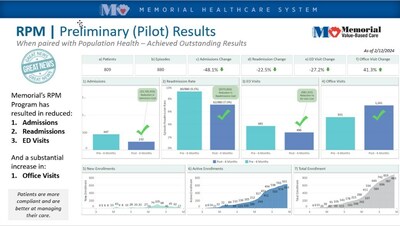Remote monitoring improves access, outcomes, and lowers costs for individuals and care providers
HOLLYWOOD, Fla., Feb. 29, 2024 /PRNewswire-PRWeb/ -- Remote monitoring technology, some of it simple and some more complex, is proactively making a difference for patients and the clinicians that provide their care.
It was less than two years ago that 73-year-old Jules Penn couldn't walk for two minutes without stopping or drive ten miles without becoming fatigued. Suffering from undiagnosed heart failure, even eating was problematic. "He was so stressed, always in a bad mood, and crying all the time," said Marguerite Penn, his wife of 45 years.
Penn's heart wasn't able to pump enough blood to his body, causing an increase in blood pressure and leading to shortness of breath, fatigue, swelling and other debilitating symptoms. The condition can be controlled with medication but, left untreated, can have deadly consequences.
A diagnosis at provided Penn clarity on what he was experiencing but it was his enrollment in Memorial's remote patient monitoring program that delivered peace of mind. The North Miami resident had a CardioMEM sensor implanted in his heart's pulmonary artery to measure increases in pressure, a key indicator of an organ in decline. Penn needs only to lie on a special pillow to transmit data to his cardiology team through a secure network connection.
"We're able to detect silent symptoms and potential issues weeks before a patient would even know there was a problem," said , an advanced heart failure and transplant cardiologist at Memorial's Total Heart Center. "Often it's just an adjustment to medication that's required to avoid a significant issue."
More than five million Americans and about 26 million people worldwide suffer from heart failure, but it is far from the only condition that can be monitored remotely. Memorial is currently connected to more than 800 patients, some needing only basic equipment to transmit important information. Wearable watches, which can be used to monitor glucose for diabetics, blood pressure cuffs, pulse oximeters (asthma), and scales are provided and configured for each individual, with data seen in real time by clinicians uploaded directly to that person's electronic medical record. "We've integrated technology so our patients aren't required to manually send their values. Sometimes they just have to step on a scale, with any rapid weight loss or gain likely an indicator that person could need additional attention," said Monica Puga, RN, MSN, chief nursing executive for .
Puga, who also leads Memorial's population health outreach, says the system's commitment to remote patient monitoring has paid dividends for those in the program, including significant decreases in hospital admissions (down nearly 50%), readmissions (more than 22%), emergency department visits (27%), and an increased number of visits to primary care providers. The amount saved by reducing hospital and emergency services already tops more than $4 million dollars.
Jules Penn, however, measures impact differently. The great grandfather can now walk 30 minutes on a treadmill and drive six hours to visit family in Jacksonville. "I have so much less stress knowing Memorial will be in touch if they see something wrong. They've given me my life back."
South Florida-based Memorial Healthcare System () is a national leader in quality care and patient, physician, and employee satisfaction. Its commitment to deeper caring and smarter health prioritizes a person-centered approach that has delivered safe, positive outcomes for 70 years.
Featuring multi-disciplinary collaboration, research, innovation, and transparency within its many facilities, Memorial is focused on removing barriers, increasing access, and providing equitable care throughout the region. It employs a staff of more than 16,000 and operates six hospitals, numerous primary, urgent, and 24/7 care facilities, medical office buildings, a health specialty center, and nursing home.
To learn more, visit mhs.net and connect on Facebook, X, Instagram, YouTube, and LinkedIn.
Media Contact
Yanet Obarrio Sanchez, Memorial Healthcare System, 954-265-1136, [email protected],
SOURCE Memorial Healthcare System



Share this article